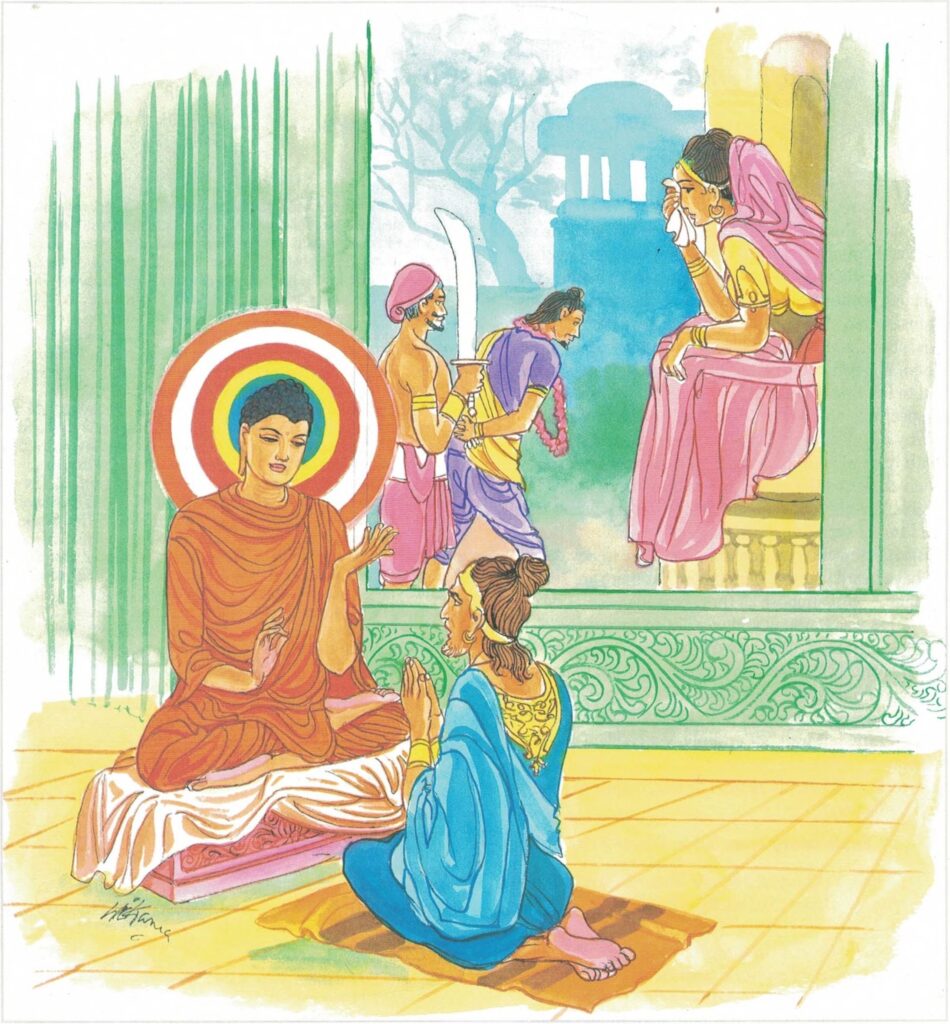Pali text, illustration and English translation of Dhammapada verse 214:
ratiyā jāyatī soko ratiyā jāyatī bhayaṃ |
ratiyā vippamuttassa natthi soko kuto bhayaṃ || 214 ||
214. From lustfulness arises grief, from lustfulness springs fear, one wholly free of lustfulness has no grief—how fear?

The Story of Licchavi Princes
While residing at the Kūtāgāra Monastery in Vesāli, the Buddha spoke this verse with reference to the Licchavi princes.
The story goes that on a certain festival day, the Licchavi princes, adorned with adornments of the greatest possible variety, departed from the city to go to the pleasure garden. As the Buddha entered the city for alms, he saw them and addressed the monks, “Monks, just look at those Licchavi princes! Those of you who have never seen the thirty-three deities, take a look at those princes!” So saying, the Buddha entered the city.
On the way to the pleasure garden the princes saw a certain courtesan and took her with them. Becoming jealous of each other over the courtesan, they fell to fighting with each other and set flowing as it were a river of blood. Men laid them on frame-mattresses, lifted them up, and carried them off. After the Buddha had eaten his meal, he departed from the city.
When the monks saw the Licchavi princes thus borne along, they said to the Buddha, “Venerable, early in the morning the Licchavi princes departed from the city adorned and beautified like gods. Now, however, all because of a single woman, they have come to this sad plight. Said the Buddha, “Monks, whether sorrow or fear arises, it arises solely because of lust.”
Explanatory Translation (Verse 214)
ratiyā soko jāyatī ratiyā bhayaṃ jāyatī ratiyā
vippamuttassa soko natthi bhayaṃ kuto?
ratiyā: because of lust; soko: sorrow; jāyatī: is born; ratiyā: because of lust; bhayaṃ [bhaya]: fear; jāyatī: arises; ratiyā vippamuttassa: to one free of lust; soko natthi: there is no sorrow; bhayaṃ [bhaya]: fear; kuto: how can there be?
From passion arises sorrow. From passion fear arises. To one free of passion there is no sorrow. In such a person how can there be fear?
Commentary and exegetical material (Verse 214)
The Licchavi princes: This verse was spoken by the Buddha to mark an incident in which the Licchavi princes figured. The Licchavis, whose capital was Vesāli–one of the greatest cities of India in the Buddha’s day–were a very proud dynasty. The following incident illustrates it.
The Licchavis of Vesāli heard that the Buddha had come to Vesāli and was dwelling at the mango grove of Ambapāli. They got into a fleet of valuable vehicles and proceeded towards the mango grove. Some of them were dark blue in complexion, and they were dressed in dark blue garments and decked in dark blue ornaments. Some of them were yellowish in complexion, They were dressed in yellowish garments and decked in yellowish ornaments. Some of the Licchavis were reddish in complexion, and they were dressed in reddish garments and decked in reddish ornaments. Some of them were pale in complexion, and they were dressed in pale garments and decked in pale ornaments.
Ambapāli drove her vehicles against those of the young Licchavis, axle to axle, wheel to wheel and yoke to yoke. Then the Licchavis addressed Ambapāli.
“Why do you, Ambapāli, drive like this, axle to axle, wheel to wheel and yoke to yoke against the young Licchavis.”
“That is simply because I have invited the Blessed One with the fraternity of monks to alms tomorrow at my residence,” said Ambapāli.
“Will you give that chance to us, Ambapāli, for a hundred thousand gold coins?” asked the Licchavis.
“No, my lords, even if you were to offer me the entire Vesāli with all its colonies, I will not give you this chance of offering the meal.”
The Licchavis snapped their fingers, and said, “We have been outdone by this woman of the mango grove. We have been beaten by this woman of the mango grove.”
They, however, proceeded towards the mango grove, and the Buddha, seeing them at a distance, said to the fraternity of monks, “Those of you monks who have not seen gods of the Tāvatiṃsa world may look at these Licchavi princes, and think of them as quite comparable to gods of the Tāvatiṃsa.”
The Licchavi princes got down from their vehicles, and walked up to the place where the Buddha was seated. They sat aside and listened to the admonition of the Buddha. Although they invited the Buddha and the fraternity of monks to alms next day, the Buddha said that He had already accepted an invitation to alms from Ambapāli. The Licchavi princes snapped their fingers, and said, “We have been outdone, and we have been beaten by the woman of the mango grove.”